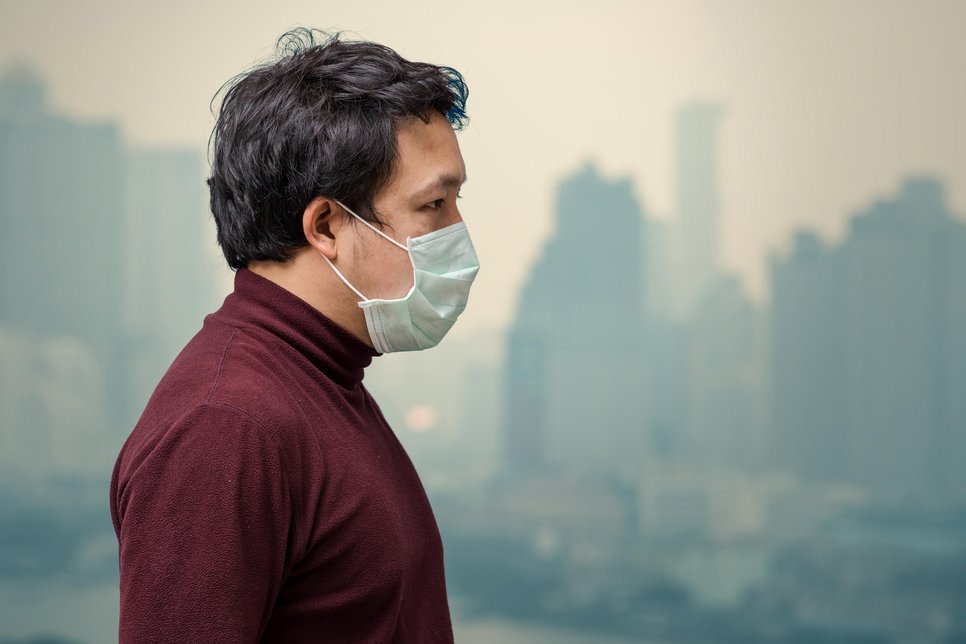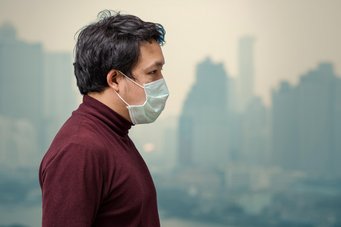Corona Lockdowns: Cleaner air saves lives
Reduced air pollution by the coronavirus lockdowns leads to less premature deaths and asthma cases amongst children
The drastic measures taken in the fight against coronavirus not only prevented many potentially fatal Covid 19 cases. The response to the pandemic has caused an unprecedented reduction in global economic activities, including traffic, power generation and industry. This has an impact on global air quality. An international team of scientists discovered a positive effect of the lockdowns on public health: Reduced tropospheric and ground-level air pollution concentrations lead to a significantly smaller number of premature deaths among adults and pediatric asthma cases.

“We estimate that there was a net total of 7400 premature deaths and 6600 pediatric asthma cases avoided during the first two weeks post-lockdown”, says Jos Lelieveld, Director at the Max Planck Institute for Chemistry and a co-author of a study which has been published last week. The scientists used data from the first two weeks of lockdowns in each country. In China and India alone, the avoided premature mortality related to fine particulate matter reductions was 1400 and 5300 deaths, respectively. Since both countries have both the highest pollution levels and the highest population density, they benefit most from the drop in pollutant levels. Air pollution, especially particulate matter, can cause respiratory and cardiovascular diseases and thereby affects the number of premature deaths.
The corona crisis illustrates the importance of global air pollution
The researchers also estimate that if the lockdown-induced drop in pollutant concentrations would be maintained for the duration of 2020, 780,000 premature deaths amongst adults and 1.6 million asthma cases amongst children could be avoided globally. According to the scientists, these findings illustrate the potential health benefits gained from reducing 'business as usual' air pollutant emissions from economic activities. “By no means do we want to imply that lockdown economic activity is desirable or sustainable. However, we do intend to use the current situation as an intuitive means of highlighting the significance of the often-overlooked global air pollution health crisis”, adds Zander Venter from the Norwegian Institute for Nature Research in Oslo and first author of the paper published on the preprint server medRxiv. The manuscript which Zander and his colleagues submitted to a scientific journal, is currently in the peer-review process.
The researchers used satellite data and a network of over 10,000 air quality stations in 27 countries to measure the impact of the enforced lockdown measures. After accounting for the effects of meteorological variability, they found that the reduction of activities had led to decreased air pollution levels by approximately 20% across 27 countries. The list includes various European countries such as Germany and Spain but also e.g. China and Chile. The team noticed remarkable declines in ground-level nitrogen dioxide, ozone and fine particulate matter in some of the countries during the first two weeks of respective lockdown. These results were largely mirrored by satellite measures of the troposphere.
In the long term, clean air protects health significantly more
To relate COVID-19 lockdown air pollution anomalies to premature deaths the researchers used two steps: First, they calculated the exposure to nitrogen dioxide, ozone and fine particulate matter (PM2.5) in each respective country using data from a global network of air quality stations. They then calculated the daily health burden estimate (premature mortality and asthma incidence) for each country based on the population density per country with exposure-response relationships derived from epidemiological studies. Since a sustained air pollutants reduction would have a significantly more positive effect on health than a reduction for two weeks, the number of avoidable premature deaths among adults and asthma cases in children rose disproportionately until the end of the year.
This relates to recent studies which indicate that health improvements that could be obtained by reducing air pollution globally could in fact increase the resilience of societies against other pandemics because the pool of vulnerable individuals would be smaller.
"In order to reduce air pollution in the long term even after the corona crisis, we should aim to phase out the burning of fossil fuels," says Jos Lelieveld. "This would not only improve the health of people worldwide, but also protect the climate in the longer term."
